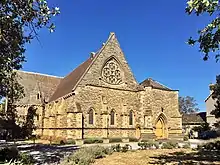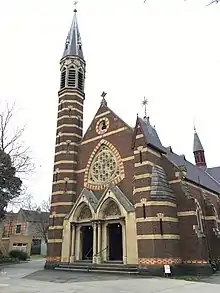Albert Purchas
Albert Purchas (1825 – 1909) was a prominent 19th century architect and surveyor in Melbourne, Australia.
Albert Purchas | |
|---|---|
| Born | 1825 Chepstow, Monmouthshire, Wales |
| Died | 26 September 1909 (aged 83–84) Kew, Victoria |
| Nationality | British |
| Occupation | Architect |
| Buildings | Glenara Homestead, Bulla ; St George's Presbyterian Church, East St Kilda |
Early life
Albert Purchas was born in Chepstow, Monmouthshire, Wales in 1825, the son of Robert Whittlesey Purchas and Marianne Guyon. He was the brother of Arthur Guyon Purchas.
He emigrated to Melbourne in 1851, and soon established a private practice as a surveyor and architect.[1]
On 1 Nov 1854 in St Kilda, he married Eliza Anne Swyer (c1825–1869), the eldest daughter of Robert Swyer, of Kersal, Lancashire.[2]
Albert and Eliza had a large family, with 10 children, although several died young. Their children included Marian Eliza Purchas (c1855-c1875), Claude Albert Guyon Purchas (c1857), Robert Guyon Whittlesey (6 September 1862 – 4 June 1940), Edith Matilda (c1859-1885), Violet (c1860-c1875), Beatrice Purchas (c1864), Lillian Purchas (c1864), Ethel Annie (c1865-c1938); Adeline (c1867), Elaine Alberta (c1868-c1891).[2]
Architectural practice

Purchas was soon joined his brother-in law Charles R Swyer in the partnership of Purchas & Swyer, which lasted from 1856 to 1862, after which he again practiced alone up to about 1891.[3] Purchas had his offices at 81 Little Collins;[4] and later 30 Queens Street, 81 Chancery Lane and finally 462 Little Collins Street.
Alone or with Swyer purchase is said to have designed over 140 houses, offices, churches, banks and cemetery buildings in Victoria in his long career. Berkely Hall St Kilda dating from 1854 is one of his first buildings, and still exists, though the original house is obscured by an early 20thC verandah.[5] Another notable early design was the head office of the Melbourne Savings Bank, built on the corner Flinders Lane and Market Street in 1857-58, in an elaborately detailed Renaissance Revival style.
His churches were mostly Gothic Revival, built for the Anglican Church, along with some parsonages, while most of the bank buildings were Renaissance Revival designs for the Bank of Australasia.[6] He also designed city buildings in the 1860s and 70s, such as the Mutual Insurance Co, Northern Insurance Co, and the first premises for George & George, destroyed by fire in 1889.[3]

One of his most outstanding designs is St George's Presbyterian Church in Chapel Street, St Kilda (1877–80), in a striking polychrome brick Gothic Revival style, unusually carried on through to the interior.[7]
Several Australian architects obtained experience working in Purchas's office, including South Australian architect Edward Davies (1852-1927),[8] while another pupil, William Black, became a senior partner in the well-known Cape Town, South Africa partnership of Black & Fagg. During his pupilage to Purchas, Black won several prizes offered by the RVIA, among them the Royal Victoria Institute of Architects' award in December 1885.[9]
Other activities
Purchas produced one of the few published maps and compilations of the early pastoral settlers runs in Victoria in 1853[10]
In the same year he designed the layout of the Melbourne General Cemetery, the first 'garden' cemetery in Victoria, a curvilinear layout with extensive plantings, as well as the gate lodge and gates (the gates lodge were demolished and the gates relocated to their present position in the 1930s).[11] He was a long time member of the Cemetery Trust, serving as secretary from 1876-1886. He was also Chairman of the Boroondara General Cemetery Board of Trustees 1867 to 1909,[6] and designed many aspects of the cemetery, including the landscape, the cast iron entrance gates (1889), the rotunda (1890) and the surrounding brick wall (1895–6).[12] He was also involved with the philanthropic Old Colonists Homes in North Fitzroy, arranging the fencing in 1870.[13]
He was vice president of the Royal Victorian Institute of Architects for many years, and President in 1887-8.[14]
He also was a subscriber to the Philosophical Society of Victoria in 1855, and a member of the Philosophical Institute of Victoria 1857-8.[15]
Purchas was a keen inventor having applied for a patent for an invention for lighting a railway carriage with gas in 1861,[16] and won a competition for a model farm complex, in 1862. This unusual design had the dairy either underground or half underground, to keep it cool, with a 'dry lining' around the outside of the sunken portions.[17] In 1883, with fellow architect Alfred Smith, he took out a patent for fire-proof floors, arches, staircases and other parts of buildings.[18]
Selected works
The Miles Lewis Architectural Index[19] has 218 entries for Albert Purchas, and more for Purchas & Swyer. Notable works amongst this prolific output include:
- Hawthorn Village Plan, 1851[20]
- Melbourne General Cemetery layout, gate lodge and gates, Carlton, 1853.[21]
- Berkeley Hall, 11 Princes Street, St Kilda, 1854 (original house hidden by early 20thC verandah) [22]
- Christ Church Anglican Church (nave only), Brunswick, 1857[23]
- Christ Church (nave and transepts), St Kilda, 1854-7 [24]
- Temple Court, Collins Street frontage, 1857[25]
- Glenara Homestead, Bulla, 1857 [26]
- Melbourne Savings Bank, corner Flinders Lane and Market Street, Melbourne, 1857-58 [27][28] (demolished c1928)
- Bank of Australasia, 2 Malop Street Geelong, 1859-60 (interiors intact but exterior refaced)[29]
- Beck's Imperial Hotel, Lyttleton St, Castlemaine, 1861 (verandah is later)[30]
- St John's, Malmsbury, Victoria, 1861-66[31]
- Melbourne Meat Preserving Company Buildings, Van Ness Avenue, Maribyrnong, c1868[32][33]
- Corsewall, Hawthorn, before 1875[34] (demolished)
- St George's Presbyterian Church, East St Kilda, 1877-1880[35]
- Barristers’ Chambers, Bourke Street through to Little Collins Street near William Street, 1882[36] (demolished c1969)
- National Bank of Australasia, 261 Victoria Street Abbotsford, 1887[37]
- St Hilary's Church of England, John and Rowland Streets Kew, 1888 [38](demolished)
- The United Service Home (Crimea Veterans Home), 1 Crimea Street, Drysdale, 1891 [39][40]
Later life
In 1878, Purchas was one of several architects who protested the choice of an overseas architect for the design of the Melbourne Anglican Cathedral, pointing out the expertise in the profession in Victoria and the need for someone aware of local conditions.[41] He also sat on the examining committees of the Victorian Architects Institute and selected annual student prizewinners.[42]
In 1883 he purchased the Isle of Wight Hotel on Philip Island from John Richardson, possibly as a retirement interest or investment.[43]
In the early 1880s his son, Robert Guyon Whittlesey Purchas was articled in his office, who went on to become a prominent architect himself, championing the Arts & Crafts in the 1890s-1900s.
In 1896, when he was in his early 70s, he made the news, having been summonsed for taking offense when a railway employee asking to see his ticket, and attacking him with his cane.[44]
Purchas died in his home in Kew in 1909 and was buried at Boroondara Cemetery. He left an estate of the value of £5,878.[45]
References
- An early story is that one of his first jobs, when he would have been about 25 year old, was a position under Surveyor-General Robert Hoddle, and disagreeing with him over the line for St Kilda Road, appealed to Governor La Trobe, and successfully got the road diverted around the hill which eventually became the site of the Shrine of Remembrance. There may not be much truth to this since by 1851 St Kilda Road was already a well worn track running around the hill, the top of which LaTrobe had reserved for a Government House in 1840.
- Suzie Zades, Biographical Family Report for Albert Purchas
- Encyclopedia of Australian Architecture. Cambridge University. 2012. p. 570.
- Victoria and its Metropolis ii, p 529
- St Kilda Historical Society
- Albert Purchas: architect, soldier, inventor 19th JUNE 2013
- "St Georges Uniting Church". Victorian Heritage Databse. Retrieved 23 June 2018.
- Architects of South Australia, Copyright 2008, Published by Architecture Museum, University of South Australia
- "Radford, Dennis 'JC. Black', William Patrick Henry: in HSRC. 1987. Dictionary of South African Biography Volume V: pp 54". Archived from the original on 23 April 2012. Retrieved 14 April 2014.
- Albert Purchas Book of Reference to Map of the Settled Districts Around Melbourne, in the Colony of Victoria Publisher: Goodhugh and Trembath, 1853
- "Melbourne General Cemetery". Victorian Heritage Database. Retrieved 23 June 2018.
- "BOROONDARA GENERAL CEMETERY". Victorian Heritage Database. Retrieved 23 June 2018.
- Fitzroy: Melbourne's First Suburb, Fitzroy Historical Society, p.62
- "Purchas, Albert (1825 - 1909)". Encyclopedia of Australian Science. Retrieved 14 January 2019.
- Alphabetical List of Members 1854–1872 Science and the making of Victoria, Australian Science and Technology Heritage Centre and The Royal Society of Victoria 2001
- Victoria government gazette, 2 August 1861, p.1484, patent number 479
- Miles Lewis, Australian Building, Citing Farmers' Journal and Gardeners' Chronicle, 4 July 1863, p 424, as advised by Deborah Kemp, 1998
- Victoria government gazette, 17 August 1883, p. 1876; patent number 3533
- "AUSTRALIAN ARCHITECTURAL INDEX". Miles Lewis. Retrieved 22 June 2018.
- "Hawthorn Village from the west". Hawthorn Historical Society. Retrieved 22 June 2018.
- "Melbourne General Cemetery". Victorian Heritage Database. Retrieved 23 June 2018.
- St Kilda Historical Society, 'Buildings'
- Organ Historical Trust of Australia, Christ Church Anglican Church Brunswick
- "Christ Church Complex". Victorian Heritage Database. Retrieved 22 June 2018.
- "IMPROVEMENTS IN COLLINS STREET WEST". The Age (851). Victoria, Australia. 13 July 1857. p. 5. Retrieved 8 February 2019 – via National Library of Australia.]
- Miles Lewis Mansions Database
- "Miles Lewis Architecture Index, University of Melbourne". Archived from the original on 15 April 2014. Retrieved 14 April 2014.
- "Melbourne Savings Bank (photograph)". State Library of NSW. Retrieved 25 June 2018.
- "ANZ BANK". Victorian Heritage Database. Retrieved 22 June 2018.
- "Imperial Hotel". Victorian Heritage Database. Retrieved 14 January 2019.
- "St John's Anglican Church". Victorian Heritage Database. Retrieved 14 January 2019.
- Academy of Technological Sciences and Engineering, Technology in Australia 1788-1988
- "Pipe Makers Park Complex". Victorian Heritage Database. Retrieved 22 June 2018.
- "Walking Melbourne forum". Archived from the original on 15 April 2014. Retrieved 14 April 2014.
- Walking Melbourne
- WorldCat Most widely held works by Albert Purchas
- "National Bank of Australasia, Former". Victorian Heritage Database. Retrieved 22 June 2018.
- "Artwork - Rear View of Old St Hilary's (Kew)". Victorian Collections. Retrieved 14 January 2019.
- "War Veterans Home". Victorian Heritage Database. Retrieved 22 June 2018.
- Shirley Jones collection of Victorian postcards, State Library Victoria H90.160/1092
- "THE ARCHITECTS AND THE CATHEDRAL". The Argus. Melbourne: National Library of Australia. 28 January 1878. p. 6. Retrieved 15 April 2014.
- "TUESDAY, NOVEMBER 8, 1881". The Argus. Melbourne: National Library of Australia. 8 November 1881. p. 6. Retrieved 15 April 2014.
- Phillip Island History
- "RAILWAY PROSECUTION". The Argus. Melbourne: National Library of Australia. 22 January 1896. p. 6. Retrieved 15 April 2014.
- "WILLS AND ESTATES". The Argus. Melbourne: National Library of Australia. 2 November 1909. p. 5. Retrieved 12 April 2014.
Further reading
- O'Neill, Frances. "The making of a professional: Albert Purchas, 1825-1909", unpublished manuscript, n.d.
- Melbourne University Archives PURCHAS AND SWYER, ACCESSION NO 1972.0012 http://gallery.its.unimelb.edu.au/imu/imu.php?request=multimedia&irn=6159